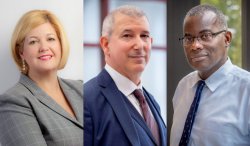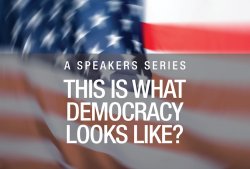This is What Democracy Looks Like?
Montclair State scholars launch conversations on nation’s challenges
Posted in: Humanities and Social Sciences, University

In the wake of the January 6 attack on the Capitol and impeachment hearings of former President Donald J. Trump, a virtual speaker series, “This is What Democracy Looks Like?” addresses the critical challenges and divisions facing the nation.
The first event on February 11, “Authoritarianism in America?” featured three of Montclair State’s prominent scholarly experts, Brigid Callahan Harrison, professor of Political Science and Law; Peter Kingstone, dean of the College of Humanities and Social Sciences; and History Professor Leslie Wilson, associate dean of the College of Humanities and Social Sciences.
Presenting on Zoom, 100 people tuned into the conversation as the scholars cautioned about the dangerous political divide and the need for national reconciliation.
“Why do I think democracy is at risk?” asked Kingstone, author of several books on Latin American political economy, focusing on the subject of democratization, economic reform and most recently populism. “We are phenomenally polarized and divided in this country to the point that we not only can’t agree on basic narratives and basic interpretations, we can’t agree on basic facts.”
The Office of Faculty Advancement, which seeks to support faculty in all aspects of their work at the University, is presenting the series to examine intersections of race, gender and democracy and how these affect the Montclair State campus, community and nation from multiple disciplinary perspectives.
“Americans may say that they want democracy but they don’t know how to keep it and they don’t want to work for it,” said Wilson, who lectures and writes on American history and African American studies. “As a result, some Americans display degrees of ignorance, apathy or fear, which suggests that they favor authoritarian-style leaders because they want someone else to solve their problems.”
“You ask Americans, what do we agree on?” said Harrison, a political science scholar specializing in American government. “We agree on a lot. We agree on equality of opportunity. We agree that elected officials should be held accountable. We agree on fundamental concepts of liberty. Some people believe in stronger institutions than others, but there are values that are common to all of us.”
Harrison said she is “hopeful and energized because of how young people are participating in our political life. They are much more engaged; this is fact not opinion. They are measurably more engaged than any other generation,” including voting more frequently and volunteering in their communities.
Wilson added change will occur. “I think it will happen largely because young people in America will reject the status quo.”

Upcoming This is What Democracy Looks Like? events include a roundtable discussion titled “Democracy and its Discontents” facilitated by the English Department on February 17; virtual guest lectures by Khalil Gibran Muhammad, professor of History, Race and Public Policy at Harvard Kennedy School, and Suzanne Young Murray, professor of the Radcliffe Institute for Advanced Studies on March 10; and a panel discussion on economics and democracy on March 18.
Story by Staff Writer Marilyn Joyce Lehren
You May Also Like:
